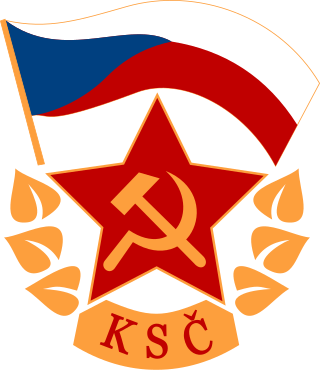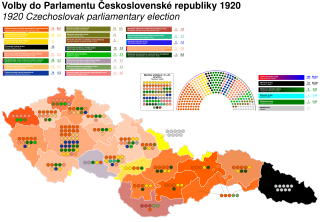
The Communist Party of Czechoslovakia was a communist and Marxist–Leninist political party in Czechoslovakia that existed between 1921 and 1992. It was a member of the Comintern. Between 1929 and 1953, it was led by Klement Gottwald. The KSČ was the sole governing party in the Czechoslovak Socialist Republic though it was a leading party along with the Slovak branch and four other legally permitted non-communist parties. After its election victory in 1946, it seized power in the 1948 Czechoslovak coup d'état and established a one-party state allied with the Soviet Union. Nationalization of virtually all private enterprises followed, and a command economy was implemented.

Bulgaria elects a head of state—the president—and a legislature on a national level. The president is elected for a five-year term by the people directly. The National Assembly has 240 members elected for a four-year term by proportional representation in multi-seat constituencies with a 4% threshold. Bulgaria has a multi-party system in which usually no party receives a required majority and parties have to collaborate to form governments, generally via confidence and supply or coalition agreements.

The Federal Assembly was the highest organ of state power of Czechoslovakia from 1 January 1969 until the amendment of the state constitution on 23 April 1990. From 23 April 1990 until the dissolution of Czechoslovakia on 31 December 1992, it functioned as the state's federal legislature.

Parliamentary elections were held in the Czech Republic on 14 and 15 June 2002. The result was a victory for the Czech Social Democratic Party, which won 70 of the 200 seats, and formed a coalition government with the KDU-ČSL and Freedom Union – Democratic Union. Voter turnout was 58%.
Jozef Pribilinec is a Slovak track and field athlete who mainly competed in racewalking. He was born in Kopernica. Pribilinec competed for the former Czechoslovakia at the 1988 Summer Olympics held in Seoul, South Korea where he won the gold medal in the men's 20 kilometre walk event.

General elections were held in Romania in December 1937. The Chamber of Deputies was elected on 20 December, whilst the Senate was elected in three stages on 22, 28 and 30 December. Voting was by universal male suffrage, making them the last elections held before women could vote.

Parliamentary elections were held in Czechoslovakia on 18 and 25 April 1920. Members of the Chamber of Deputies were elected on 18 April and members of the Senate on 25 April. The elections had initially been planned for mid- or late 1919, but had been postponed.

Parliamentary elections were held in Hungary on 25 March 1990, with a second round of voting taking place in all but five single member constituencies on 8 April. They were the first completely free and competitive elections to be held in the country since 1945, and only the second completely free elections with universal suffrage in the country's history. The conservative, nationalist Hungarian Democratic Forum (MDF) beat the liberal and more internationalist Alliance of Free Democrats, which had spearheaded opposition to Communist rule in 1989, to become the largest party in parliament. The Hungarian Socialist Party, the former Communist party, suffered a crushing defeat, winning only 33 seats for fourth place.
Constitutional Assembly elections were held in Bulgaria on 10 June 1990, with a second round for eighteen seats on 17 June. They were the first elections held since the fall of Communism the previous winter, and the first free national elections since 1931. The elections were held to elect the 7th Grand National Assembly, tasked with adopting a new (democratic) constitution. The new electoral system was changed from 400 single-member constituencies used during the Communist era to a split system whereby half were elected in single member constituencies and half by proportional representation. The result was a victory for the Bulgarian Socialist Party, the freshly renamed Communist Party, which won 211 of the 400 seats.

Constitutional Assembly elections were held in Bulgaria on 27 October 1946, electing members of the sixth Grand National Assembly, which was tasked with adopting a new constitution. The Fatherland Front, an anti-fascist coalition dominated by the Bulgarian Communist Party, had come to power in 1944 following a coup. Now that World War II was over and the monarchy abolished, the communists wanted to adopt a new constitution. They won a large majority, with 54% of the vote and 278 of the 465 seats. Voter turnout was 93%. This would be the lowest vote share that the Communists or the Fatherland Front would claim during the 43 years of the People's Republic of Bulgaria. In subsequent years, the Fatherland Front would claim to win elections with unanimous or near-unanimous support. This would be the last truly multi-party elections until 1990.

Federal elections were held in Czechoslovakia on 8 and 9 June 1990, alongside elections for the Czech and Slovak Assemblies. They were the first elections held in the country since the Velvet Revolution seven months earlier. Voter turnout was 96.2%.

Federal elections were held in Czechoslovakia on 5 and 6 June 1992, alongside elections for the Czech and Slovak Assemblies. The result was a victory for the Civic Democratic Party–Christian Democratic Party (ODS-KDS) alliance, which won 48 of the 150 seats in the House of the People and 37 of the 150 seats in the House of Nations. Voter turnout was 84.7%.

Parliamentary elections were held in Czechoslovakia on 26 and 27 November 1971. They were the first held after the Constitutional Act on the Czechoslovak Federation converted Czechoslovakia into a federal republic, comprising the Czech Socialist Republic and the Slovak Socialist Republic, as well as the first elections in Czechoslovakia held in the aftermath of the Prague Spring.

Parliamentary elections were held in Czechoslovakia on 22 and 23 October 1976. The National Front put forward a single list of candidates for both the House of the People and the House of Nations and one NF candidate ran in each single member constituency. With a total of 350 seats in the two Houses, 237 were assigned to the Communist Party of Czechoslovakia, 18 to the Czechoslovak People's Party, 17 to the Czechoslovak Socialist Party, four to the Party of Slovak Revival and 74 to others. Voter turnout was reported to be 99.7%.

Parliamentary elections were held in Czechoslovakia on 5 and 6 June 1981. The National Front put forward a single list of candidates for both the House of the People and the House of Nations and one NF candidate ran in each single member constituency. With a total of 350 seats in the two Houses, 240 were assigned to the Communist Party of Czechoslovakia, 18 to the Czechoslovak People's Party, 18 to the Czechoslovak Socialist Party, four to the Party of Slovak Revival, four to the Freedom Party and 66 to independents. Voter turnout was reported to be 99.51%.

Parliamentary elections were held in Czechoslovakia on 23 and 24 May 1986. The National Front put forward a single list of candidates for both the House of the People and the House of Nations and one NF candidate ran in each single member constituency. With a total of 350 seats in the two Houses, 242 were assigned to the Communist Party of Czechoslovakia, 18 to the Czechoslovak People's Party, 18 to the Czechoslovak Socialist Party, four to the Party of Slovak Revival, four to the Freedom Party and 64 to independents. Voter turnout was reported to be 99.39%.

Parliamentary elections in the First Czechoslovak Republic were held in 1920, 1925, 1929 and 1935. The Czechoslovak National Assembly consisted of two chambers, the Chamber of Deputies and the Senate, both elected through universal suffrage. During the First Republic, many political parties struggled for political influence and only once did a single party muster a quarter of the national vote. Parties were generally set up along ethnic lines.

In Czechoslovakia the first parliamentary elections to the National Assembly were held in 1920, two years after the country came into existence. They followed the adoption of the 1920 constitution. Prior to the elections, a legislature had been formed under the name Revolutionary National Assembly, composed of the Czech deputies elected in 1911 in Cisleithania, Slovak deputies elected in Hungary in 1910 and other co-opted deputies.
The 1935 Czechoslovak presidential election took place on 18 December 1935. Edvard Beneš was elected the second President of Czechoslovakia and replaced Tomáš Garrigue Masaryk. Beneš's victory was considered unlikely due to lack of support in a parliament but negotiations helped him to win much larger support than Masaryk has ever received.
Klement Gottwald's Second Cabinet was the cabinet and government of Czechoslovakia in office between 25 February and 15 June 1948. It was formed following the 1948 Czechoslovak coup d'état, and marked the onset of four decades of Communist rule in the country.








